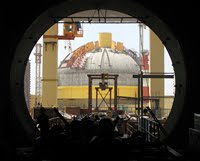After almost two years of intensive lobbying by New Delhi, the Nuclear Suppliers Group (NSG) -- the global watchdog of the sensitive nuclear trade -- is finally considering India for membership. The issue has been incorporated as a special agenda item for discussion in the NSG plenary meeting scheduled for late June. The major member states, including the U.S., Germany, France and Britain, have all indicated their support for India's candidacy.
India's quest for NSG membership raises serious questions for the nuclear nonproliferation regime, however. According to criteria set by the NSG, only signatories to the Nuclear Non-Proliferation Treaty (NPT) are eligible for membership. Accommodating India into the NSG would therefore mean creating an exception in the nonproliferation regime similar to the 2008 U.S.-India Civilian Nuclear Agreement, which ended India's nuclear isolation. The 2008 deal, unprecedented in the history of the NPT, opened nuclear trade between NSG members and India while allowing India to carry on with its nuclear weapons program.
For India, NSG membership is important for two reasons. First, for about six years, the NSG has been deliberating over fresh restrictions on the transfer of enrichment and reprocessing technologies. India needs these technologies for its fast-breeder reactor program, considered vital to the future of India's nuclear energy production. Once fresh technology-transfer guidelines are in place, it will be very difficult for India to get hold of such strategic technologies without NSG membership. Second, entering the NSG would help to further India's assimilation into the international nuclear order, a process kick-started by the 2008 nuclear deal. Membership of all major instruments of nuclear nonproliferation, such as the NSG, the Australia Group, the Wassenar Arrangement and the Missile Technology Control Regime, is pivotal in this regard. As its acceptance into the mainstream of global nuclear politics grows, India hopes that its nuclear status will ultimately be recognized as on par with the other five official nuclear weapon states -- a position that would further attest to India's global rise.

